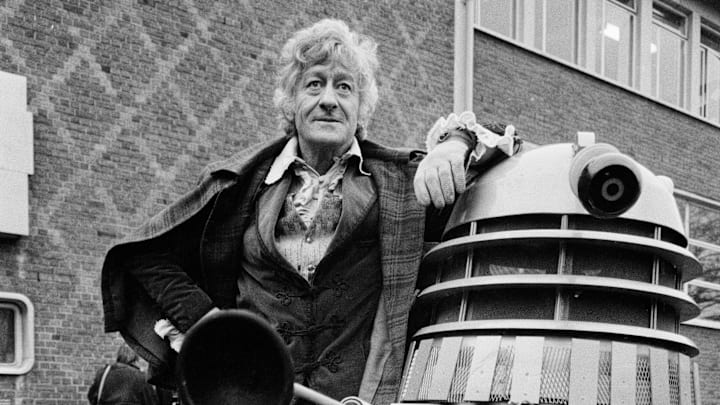What would you say is the best Dalek story of the ‘70s? That’s right, it’s undoubtedly “Genesis of the Daleks”. It's not just one of the best Dalek stories, but arguably, it's one of the greatest serials in Doctor Who history.
But what’s the second-best ‘70s Dalek story? That’s where it gets a little bit trickier. This decade has several great stories with the Doctor's oldest enemies, especially for Jon Pertwee’s Doctor. “Frontier in Space” is an excellent and surprisingly ambitious space opera, although the pepper pots barely appear in that. Then there’s the immediate follow-up “Planet of the Daleks”, a solid if not particularly original Dalek serial. Even “Death to the Daleks” - which has arguably one of the worst cliffhangers ever – cleverly uses the Daleks.
But I’d argue that the best Dalek story of Pertwee’s era – even the second-best Dalek story of the ‘70s overall – has to be “Day of the Daleks”. Ironically, Louis Marks’s story wasn’t meant to have the Daleks at all – in the original script, the Ogrons were the main monster of the story. However, it was only when the production team realized that the new season needed to have a big hook to grab the audience that they decided to add the Daleks.
Ghosts of the future
It was an excellent choice. Not just because it was the pepper pots' first appearance in five years. But also because “Day of the Daleks” was an excellent story for their major return.
The story begins with an intriguing mystery. The Earth is on the brink of war, and politician Sir Reginald Styles is organizing a peace conference to prevent it. So it’s perhaps unsurprising that he finds himself the target of an assassination attempt. But what is surprising is the attacker vanishing before his eyes - in his words, "like a ghost".
For a good portion of the story, the international world crisis is actually moved to the background, as the Doctor investigates who the mysterious “ghosts” are and why they want Styles dead. He finds the answers in the future – a future ruled by the Daleks…
Strong cast
The first thing that stands out about “Day of the Daleks” is that it's extremely well-cast. Aubrey Woods is excellent as the Controller, the Daleks’ human ally in this horrific future. He’s not your typical henchman. He isn’t allied with the Daleks because he wants power. Instead, he’s someone who genuinely believes that helping the Daleks is the best option, as fighting back would only make things worse. He’s an interesting and complex character, and Woods plays him brilliantly.
There’s also Anna Barry as the guerilla leader Anat. She plays the part with exactly the right amount of command and authority, and frankly, it's extremely refreshing to see a female character that's tougher and more hardened in this era.
Even Wilfred Carter gives a great performance as Sir Reginald Styles. He doesn’t get much screen time, but he still plays the politician with exactly the amount of pomposity and arrogance needed for the character.
Morality of time travel
What I enjoy most about “Day of the Daleks” is that it’s a great exploration of both time travel and morality. It’s ironic that for a TV series about someone who travels in time and space, the consequences of time travel are rarely explored. So it’s refreshing that we have a story like “Day of the Daleks” that focuses on a group of characters trying to change history and prevent a terrible future. Of course, they believe that the only way they can achieve that is by killing one man.
This brings me to how the story explores morality. It’s not a major aspect of the story, especially since most of the exposition is saved for the final episode. But the Doctor arguing against killing someone, even to save the lives of billions, is a great moment. It also highlights the Doctor's strong sense of morality (at least, in this incarnation).
In fact, “Day of the Daleks” does an excellent job of highlighting everything great about Jon Pertwee’s iconic Third Doctor. It has everything that this Doctor clearly enjoys: a vehicle chase, guns, Venusian aikido and even wine and cheese. It almost feels like the quintessential Third Doctor story.
Different versions
I think the only major flaw that the story had was how it presented the Daleks. In particular, the original Dalek voices were very “off”. This was the first Dalek story in five years, and it showed, at least in the broadcast version of the story.
Thankfully, this was fixed in 2011, when a new special edition of the story was released on DVD. Featuring new visual effects as well as new footage, the new presentation of the story is definitely impressive. The battle in the final episode particularly stands out, as it feels much bigger and action-packed.
But the best alteration was the addition of new Dalek voices by Nicholas Briggs. While Briggs has been voicing the Daleks in the New Series for 20 years, he made sure that the voices recorded for the new version of the story sounded much closer to those heard in other ‘70s Dalek stories, such as “Planet” and “Genesis of the Daleks”. It’s a small difference that adds a lot, at least for this Dalek fan.
But whether you watch the original version of “Day” or the special edition, you are guaranteed at least an excellent story. It may not quite match the iconic “Genesis”, but “Day of the Daleks” still stands out as a strong Dalek story in its own right. You can watch the special edition version of the story on BritBox or YouTube in the US, or BBC iPlayer in the UK. The original version is also available as an individual story on DVD, or as part of Season 9 on Blu-ray.
